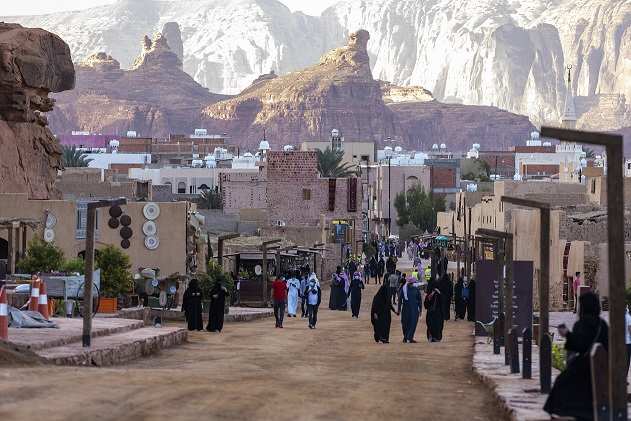12th century AlUla Old Town opened to visitors | Saudi Arabian Tourism
AlUla Old Town has welcomed its first visitors back after a three year hiatus for extensive restoration and conservation in sections of the town’s tightly packed stone and mudbrick buildings. The site, one of four significant heritage sites in AlUla, the home of ancient Kingdoms, is now officially open as a year round tourism precinct and will offer four new eateries, a suq, entertainment and a handicraft pavilion when works are completed.
The site was then closed to visitors in 2017 by the Royal Commission for AlUla (RCU) as plans were put in place to protect and restore it for the enjoyment of the local community and visitors for future generations.
Since then, restoration efforts have been focused on remedial conservation in accordance with UNESCO principles and international standards for the Conservation and Restoration of Monuments and Sites. After first repairing the Tantora Wall, the town’s sundial and a cherished landmark, the initial conservation program for the homes and mosques of AlUla Old Town was composed of three main phases: studies such as materials testing and site-wide drainage; comprehensive survey of the buildings to include 3D laser scanning; and stabilising and conserving a set of homes, two mosques and two main streets.

The latest phase of the project commenced in November 2019 and the conserved area is now open for visitors. In addition, the Incense Road running adjacent to the town has been activated and is now a vibrant area for shopping, eating and entertainment. Phillip Jones, Chief Destination Management and Marketing Officer, RCU is delighted to be able to welcome visitors to this hugely significant and fascinating site.
‘AlUla Old Town is an important chapter in AlUla’s journey through time. The site is key to the understanding, continuity, and evolution of the historic routes for trade and pilgrimage that made AlUla such a significant destination until the 20th century as it is for visitors again today,’ said Phillip.
Today visitors can access AlUla Old Town to stroll along the Incense Road which is lined with fruit and produce market stalls as well as arts and crafts, fashion and souvenirs. Visitors can dwell at one of the open air eateries along the road including AlUla’s newest fine dining restaurant Suhail, offering traditional Saudi food, the more casual One o One Burger or one of several traditional. A handicraft pavilion to see live demonstrations of ancient arts and craft and a day / night suq is also coming soon.
For a more immersive deep dive experience visitors can book a tour, which will access the specially restored streets which visit Tantora Plaza and Sundial, the two restored mosques of AlZawiyah and Hamad bin Yunis and up to the citadel for bird’s eye views of the town, as well as the recently conserved homes in the southern end of town. They have the option to do this self-guided or with a rawi, one of AlUla’s skilled storytellers.
Cultural Heritage Conservation Manager Michael Jones stresses there is much more yet to be done.
‘The team has been working on conserving the southern and eastern areas of AlUla Old Town and applying conservation best practice, experimenting with different mud brick and plasters and creating guidelines for best practice in conservation of earthen architecture in AlUla. The guidelines are in the final stages of preparation, but there is more yet to be done on the interiors of the houses along the street near the mosques, as well as the rest of Old Town,’ said Michael.
AlUla Old Town is open now and is free for visitors to pursue the market stalls and access Suhail. Tours on the restored pathways can be booked online at experiencealula.com
About AlUla
Located 1,100 km from Riyadh, in North-West Saudi Arabia, AlUla is a place of extraordinary natural and human heritage. The vast area, covering 22,561km², includes a lush oasis valley, towering sandstone mountains and ancient cultural heritage sites dating back thousands of years to when the Lihyan and Nabataean kingdoms reigned. The most well-known and recognised site in AlUla is Hegra, Saudi Arabia’s first UNESCO World Heritage Site. A 52-hectare ancient city, Hegra was the principal southern city of the Nabataean Kingdom and is comprised of more than 100 well preserved tombs with elaborate facades cut out of the sandstone outcrops surrounding the walled urban settlement. Current research also suggests Hegra was the most southern outpost of the Roman Empire after conquering the Nabataeans in 106 CE
In addition to Hegra, AlUla is home to a fascinating historical and archaeological sites such as: Ancient Dadan, the capital of the Dadan and Lihyan Kingdoms, which is considered one of the most developed 1st-millennium BCE cities of the Arabian Peninsula; thousands of ancient rock art sites and inscriptions at Jabal Ikmah; Old Town, a labyrinth of more than 900 mudbrick homes developed from at least the 12 th century, and Hijaz Railway and Hegra Fort, key sites in the story and conquests of Lawrence of Arabia.
About The Royal Commission for AlUla
The Royal Commission for AlUla (RCU) was established by royal decree in July 2017 to protect and safeguard AlUla, a region of outstanding natural and cultural significance in North-West Saudi Arabia. RCU is embarking on a long-term plan to develop and deliver a sensitive, sustainable transformation of the region, reaffirming it as one of the country's most important archaeological and cultural destinations and preparing it to welcome visitors from around the world. RCU’s development work in AlUla encompasses a broad range of initiatives across archaeology, tourism, culture, education and the arts, reflecting the ambitious commitment to cultivate tourism and leisure in Saudi Arabia, outlined in Vision 2030.
To join us on Facebook Click Here and Subscribe to UdaipurTimes Broadcast channels on GoogleNews | Telegram | Signal


